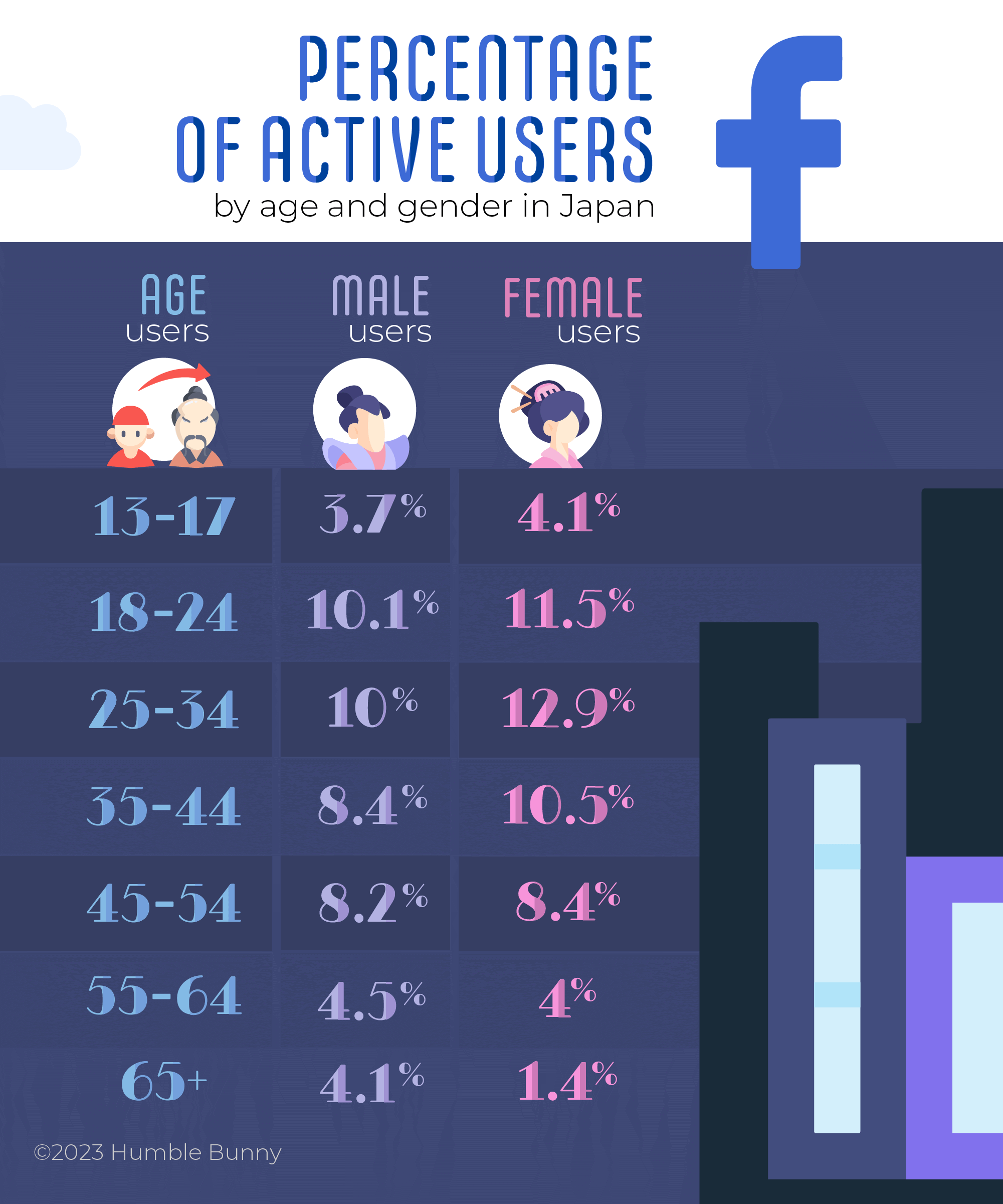Few platforms have achieved the same level of global dominance and ubiquity as Facebook (now Meta). However, the Japanese market presents a fascinating contrast with LINE, Twitter, Instagram and YouTube all ranking higher than Facebook in terms of popularity.
We explore the cultural influences that have shaped Meta’s usage and perception in the Japanese social media landscape.
Forecasted Number of Facebook/Meta Users in Japan
*Tap or Hover on the graph below to see details.
Source: Statista
In many other respects, Facebook’s success in Japan has been modest. It has a dwindling youth demographic and as well as having a smaller user base than Twitter and LINE, long-term growth of its users is expected to be outpaced by the increasingly popular TikTok.
For instance, some projections for TikTok’s user growth in Japan predict the platform will have over 22 million users in Japan by 2025, putting it just about equal, if not ahead of Meta in terms of popularity.
Learn More About the Japanese Social Media Landscape!
User Demographics on Japanese Meta

Over recent years, we can clearly see Facebook slowly becoming less and less relevant in Japan (at least among younger Japanese groups). There’s no doubt that with visual platforms like TikTok capturing people’s attention through video-based content, Facebook has found it even harder to both retain and attract a younger audience.
Cultural Factors Impacting Meta’s Reception in Japan
Japan has a unique cultural identity deeply rooted in its traditions and social dynamics. In this context, many value privacy and tend to be more reserved, which contrasts with the open and public nature of Facebook’s platform.
It has been argued by many that this cultural preference for discretion is one of the biggest factors impacting Facebook’s reception among Japanese users.
Japan also places a strong emphasis on privacy protection and data security and Meta’s past privacy controversies and perceived mishandling of user data have contributed to trust issues among Japanese users.
Concerns about personal information leakage and potential misuse of data have made some Japanese cautious about embracing Facebook fully. Instead, many prefer to use Twitter where they can operate somewhat anonymously if they choose, revealing very little personal information.
Competition from Other Social Media Platforms
The dominance of domestic social media platforms in Japan, such as LINE, has always presented a challenge for Meta’s popularity.
LINE, a messaging app, has gained immense popularity due to its features tailored for the Japanese market. It offers various localized services like stickers, official accounts, and integrated payment systems that have resonated with Japanese users.
Twitter, on the other hand, has become a preferred platform for real-time news and public discourse, aligning well with the Japanese population and its distrust of organizations, according to studies such as the Edelman Trust Barometer.
The short and concise way of communicating on Twitter also works well with local users who often prefer to catch-up on news on-the-go, often using their mobile devices when traveling to and from work in busy cities like Tokyo and Osaka.
Language and Cultural Localization
Facebook’s success in any market heavily relies on effective localization efforts. While Facebook has made strides in adapting its platform to Japanese users, challenges remain. For instance, Japanese language intricacies and unique character sets pose localization challenges, requiring special attention to user interface, content translation, and cultural sensitivity.
Incomplete localization can create a barrier for Japanese users in fully engaging with the platform and content found on it.
Perception as a Non-Japanese Platform
During its early days, Facebook was perceived by many in Japan as a platform primarily used by non-Japanese individuals, particularly expatriates, foreigners living in Japan, and tourists.
This perception hindered its acceptance among the broader Japanese population, as some users preferred to engage with platforms that had a stronger presence and reputation within the local community.
Learn More About Localization for the Japanese Market
Facebook’s Adaptation to the Japanese Market

Facebook has recognized the importance of localization in establishing a strong presence in the Japanese market. To cater to Japanese users and align with their cultural preferences, Meta has implemented several adaptations and offerings.
- Language Support: Facebook has invested in comprehensive Japanese language support, ensuring that the platform is accessible and user-friendly for Japanese speakers. The entire user interface, including menus, buttons, and settings, has been translated into Japanese, allowing users to navigate the platform more intuitively in their native language.
- Character Sets and Typography: Japanese language utilizes unique character sets, such as kanji, hiragana, and katakana. Facebook has incorporated support for these characters, enabling users to communicate and share content using the appropriate script. The platform’s typography has also been tailored to accommodate Japanese text and ensure legibility.
- Collaboration with Local Influencers and Brands: Recognizing the power of influencer marketing in Japan, Facebook has collaborated with local influencers and brands to promote its platform. These partnerships have helped to generate localized content, engage the target audience, and showcase the relevance of Facebook in the Japanese context.
- Integration with Japanese Services: To enhance its offerings in Japan, Facebook has integrated with popular Japanese services. For instance, Facebook collaborated with Yahoo! Japan, a widely used online portal, to enable seamless login and sharing capabilities between the two platforms.
- Business Solutions for Japanese Advertisers: Meta’s advertising platform has also become more Japanese-friendly over the years, allowing brands to create targeted and culturally relevant campaigns as well as use more local payment options.
Japanese Facebook Ads – 10 PPC Mistakes to Avoid
How Do People Use Japanese Meta?

Facebook serves as a platform for individuals to connect and stay in touch with friends, family, and acquaintances, but Japanese meta is also popular for a few other reasons too.
| Job and Career Networking | Meta is also used for professional networking and job opportunities in Japan. It plays a similar kind of role to the one LinkedIn plays in other nations, helping users grow business contacts and network. Users can join industry-specific groups, connect with senior-level professionals, and explore job postings shared by companies and recruiters. |
| Business Pages and Marketing | Many businesses in Japan, both small and large, use Facebook Pages to establish an online presence and engage with their target audienc. They share information about products, services, promotions, and company updates, allowing users to follow and interact with their favorite brands. |
| Interest-Based Communities | Facebook Groups play a significant role in fostering communities of like-minded individuals in Japan. People join and actively participate in groups focused on various interests, such as hobbies, sports, parenting, cooking, travel, social causes, charities and more. These groups provide opportunities for discussions, sharing experiences, and seeking validation from peers. |
| News and Media Consumption | Although not as popular as Twitter for the consumption of news, Facebook still serves as a commonly used platform for accessing and sharing news articles, blog posts, and other forms of media—outside of more traditional forms of media (TV and newspapers). |
| Interest-Based Communities | Facebook Groups play a significant role in fostering communities of like-minded individuals in Japan. People join and actively participate in groups focused on various interests, such as hobbies, sports, parenting, cooking, travel, social causes, charities and more. These groups provide opportunities for discussions, sharing experiences, and seeking validation from peers. |
| Fundraising and Causes | Facebook’s fundraising features allow individuals and organizations in Japan to create campaigns and raise funds for various causes, including charitable initiatives and earthquake disaster relief efforts. |
HB Pro Tip: Many look to influencers and important figures for their take on current events and also take note of the comments left by other users to establish an opinion on what’s happening—aligning with the high importance the nation places on peer reviews and acceptance within the context of its collectivist cultural tendencies.
Advertising Opportunities on Facebook in Japan

While Facebook doesn’t have as large a user base as some other platforms in Japan, Japanese meta can still be a good advertising platform for the local market. A few reasons for this include:
- Targeting Options for Older Demographics: Facebook offers robust targeting options that allow businesses to define their target audience based on demographics, interests, behaviors, and location. Advertisers can create highly specific and customized campaigns that are particularly effective at reaching older users who are likely to use the platform for business and professional networking.
- Mobile-Friendly Platform: With a high mobile penetration rate in Japan, Facebook’s mobile-friendly platform ensures that businesses can reach users on their smartphones and tablets. Mobile advertising on Facebook provides an opportunity to engage with users while they are on the go.
- Ad Campaign Flexibility: Businesses that are new to Japan can set their own budget and campaign objectives on Facebook, starting small and scaling up as needed. Whether it’s brand awareness, lead generation, website traffic, or conversions, Meta’s ad platform allows businesses to optimize campaigns according to their specific goals in a way that is currently unrivaled by other SNS channels.
- Measurement and Analytics:Meta provides detailed insights and analytics on ad performance, allowing businesses to track their return on investment (ROI) and make data-driven decisions.
- Integration with Instagram: Meta owns Instagram, which is incredibly popular in Japan. Using the ad platform will also allow advertisers to run ads on both platforms, leveraging Instagram’s highly engaged user base and visual storytelling capabilities.
HB Pro Tip: We often recommend developing product-focused campaigns if your goal is generating conversions with Japanese meta ads. While motivation and lifestyle-oriented ads can work well too (if you have the right funnels in place and engaging creative content), ads that display your product in detail with a clear UVP added to the caption or text overlay have proven one of the most efficient methods of generating conversions for the majority of our clients.
Future Prospects for Meta in Japan

While companies selling to younger audiences are likely to shift their focus away from Meta, those in the B2B sector will find it the perfect space to make connections with high-value customers and clients.
Also, we still see Facebook as an important tool for providing social proof to prospective customers engaged in pre-purchase research.
The fact that Facebook uses real names also makes reviews and ratings much more credible and Japanese shoppers are still likely to use it as an important stepping stone in their purchasing journeys.
While Meta faces challenges in the Japanese social media landscape, the company has the potential to thrive among certain demographics as long as it continues to adapt to local preferences and fostering strategic partnerships that will help it to stay relevant.
Increased popularity may also result in Meta’s investments in virtual reality and augmented reality technologies, aimed at creating immersive social experiences. In Japan, where technological advancements are embraced, there is potential for Meta to leverage these technologies to provide unique and engaging social interactions that work dynamically with virtual gatherings, events, and even shopping experiences.